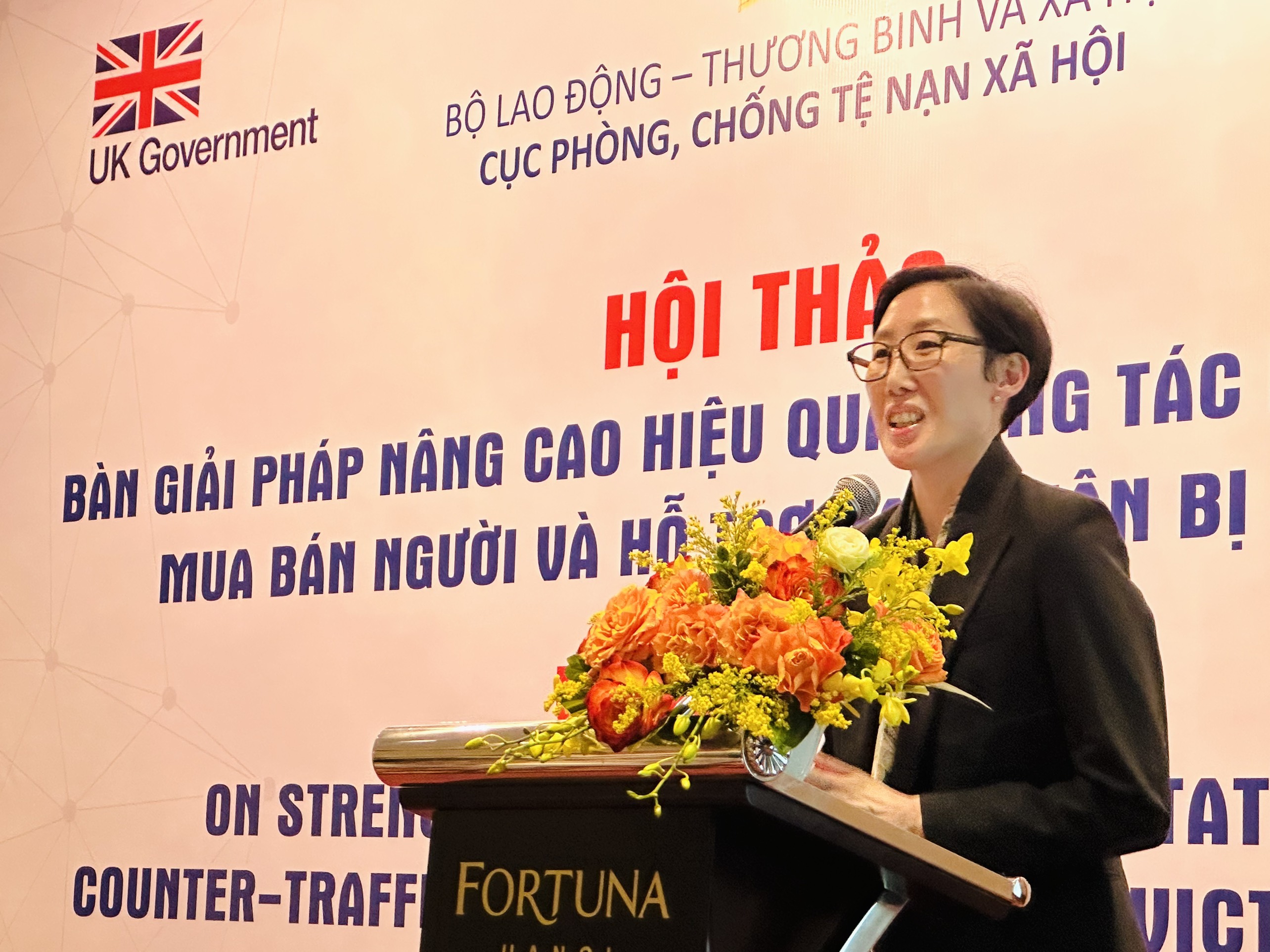-
Who We Are
WHO WE AREThe International Organization for Migration (IOM) is part of the United Nations System as the leading inter-governmental organization promoting since 1951 humane and orderly migration for the benefit of all, with 175 member states and a presence in over 100 countries. IOM has had a presence in Viet Nam since 1987.
About
About
IOM Global
IOM Global
-
Our Work
Our WorkAs the leading inter-governmental organization promoting since 1951 humane and orderly migration, IOM plays a key role to support the achievement of the 2030 Agenda through different areas of intervention that connect both humanitarian assistance and sustainable development. Across Viet Nam, IOM is concerned with the welfare and quality of life of the Vietnamese people, particularly migrant and mobile populations.
Cross-cutting (Global)
Cross-cutting (Global)
- Data and Resources
- Take Action
- 2030 Agenda
Speech of Ms Park Mihyung, IOM Chief of Mission, at the "Workshop on strengthening the implementation of counter-trafficking in persons and victim support"
Your Excellency the UK Ambassador to Viet Nam, His Excellency Iain Frew,
Dr. Kari Johnstone, Principle Deputy Diector - The Office to Monitor and Combat Trafficking in Persons (J/TIP),
Ms. Nguyen Thuy Duong, Deputy Director General, Department of Social Vice Prevention and Combat, Ministry of Labour, Invalids and Social Affairs,
Distinguished representatives including leaders and officers from Ministry of Labour, Invalids and Social Affairs, Ministry of Public Security, Ministry of Justice, Ministry of National Defense, Ministry of Foreign Affairs, People’s Procuracy, People’s Supreme Court, Viet Nam Women’s Union.
Distinguished representatives from Departments of Social Vice Prevention, Provincial Police and Border Guard of 17 provinces (Hanoi, Hai Phong, Hai Duong, Quang Ninh, Thai Binh, Thanh Hoa, Tuyen Quang, Lang Son, Lao Cai, Ha Tinh, Nghe An, Quang Binh, Dien Bien, Da Nang, Can Tho, An Giang, Tay Ninh)
Distinguished representatives from Embassies, UN Agencies, international organizations and NGOs.
Ladies and gentlemen,
It is my honor to welcome you all to today’s Workshop on strengthening the implementation of counter-trafficking in persons and victim support.
First, I would like to extend our deep appreciation to the UK government for their financial support and cooperation to support trafficked persons and migrants in vulnerable situations in Viet Nam.
Our appreciation also goes to MOLISA and the Department of Social Vice Prevention and Combat (DSVP- MOLISA) for their continuous partnership and collaboration to better protect and support victims of trafficking.
Despite the commitment to address human trafficking worldwide, it still remains a serious problem. The number of victims of trafficking has increased globally, including Viet Nam. While identified victims in Viet Nam have mainly been women and children between the ages of 16 and 28, residing in rural and ethnic minority areas , the new human trafficking trends, such as recent cases from Cambodia show a diverse range of victims, from male adults, boys, girls and infants as well. It is clear that human trafficking cuts across the sectors and borders, the intricate criminal network reaches all corners of our society to even the most remote villages. This is why we continue to emphasize that a holistic and coordinated response from both government and society is required to address these complex facets of human trafficking and to provide effective support for the victims.
The government of Viet Nam has been making remarkable efforts in counter trafficking, including the roll-out implementation of the ASEAN Convention against Trafficking in Persons, especially Women and Girls (ACTIP) in 2020, issuance of the National Plan of Action on Combating and Preventing Human Trafficking 2021-2025 and the revision of Law 69 on Vietnamese guest workers on termed contracts. Steadily, legislative efforts have been put to build a more comprehensive migration database and profile to better inform and serve evidence-based policy development and interventions. However, despite those efforts, we all recognize that there are still gaps, especially in the implementation, hindering the results and achievements that Viet Nam can make.
Tasked with the mandate of the reception and provision of coordinated support to the trafficked persons, last year, the DSVP has taken various initiatives to standardize procedures, enhance institutionalized capacities and improve coordination and referrals among relevant ministries and stakeholders. In July 2022, the Inter-ministerial Coordination Regulation on Reception, Protection, and Support for Trafficked Victims was officially signed between four Ministries: MOLISA, MPS, MOFA and MND, marking a remarkable progress and an important step forward. The Regulation has since concretized the roles and responsibilities of each governmental agency, paving the way for more effective coordination at all levels, especially in the communities where survivors return.
As reintegration assistance does not occur in isolation, international agencies, NGOs and CSOs have also been crucial in providing support to the survivors. Together with IOM and FHI360, DSVP has also been working on a reintegration handbook on the design, implementation, and monitoring of reintegration assistance for returned trafficked persons while step by step standardized screening forms for frontline officers to detect, screen, refer and identify victims of trafficking in business and service establishments which are prone to social vices.
To continue these great efforts, today, we want to reflect on the overall situation of the support for victims of trafficking, discuss plans to further improve interagency coordination and referrals, standardized tools and procedures, enhance capacities of frontline officers and practitioners for more comprehensive and effective support for victims of trafficking for the period 2023 to 2025.
We all know that that combatting trafficking in persons requires comprehensive approach and strong partnerships. That’s why we really look forward to our fruitful and productive discussion and thank you again for the participation, commitment and support in the fight against human trafficking . Together we can promote safer migration and more sustainable support for our beneficiaries and their communities that will benefit us all.
As we are concluding the second week of 2023 while the Lunar New year is drawing closer, I wish you all good health and happiness!
Xin trân trọng cảm ơn and CHÚC MỪNG NĂM MỚI!

